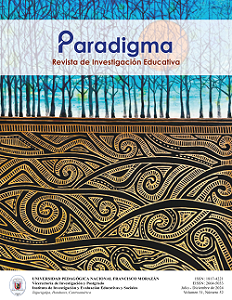Boarded subjectivity. Bodily experiences of students, graduates, and teachers in a female rural boarding school
DOI:
https://doi.org/10.5377/paradigma.v31i52.19497Keywords:
subjectivity, corporeality, bodily experience, boarding schoolAbstract
This article presents the preliminary results of the first phase of a research project that has been examining the effects on subjectivity caused by school boarding in a group of students, graduates, and teachers. Methodologically, the research was designed as a qualitative study that, from a hermeneutic approach, employs discourse analysis to explore the forms of subjectivation generated by school boarding in a group of students and teachers. In this first phase of the research, the speech acts were addressed, revealing the reality of what is happening in this educational context. Using the grounded theory methodology, a questionnaire was conducted with three focus groups (ten students, five graduates, and four teachers), which allowed for the generation of codes that account for what is happening in the boarding setting. In this regard, the research highlighted the excesses of social control based on a series of disciplinary and totalizing practices directed at students and teachers, while also recognizing the forms of agency these groups exhibit within the context of boarding.
Downloads
188
Downloads
Published
How to Cite
Issue
Section
License
Copyright (c) 2024 Universidad Pedagógica Nacional Francisco Morazán

This work is licensed under a Creative Commons Attribution-NonCommercial-NoDerivatives 4.0 International License.
Transfer of Copyright
- The author, when sending the work, states that it is his will to give the Universidad Pedagógica Nacional Francisco Morazán the patrimonial rights that correspond to him as the author of his work.
- The rights here assigned include all economic rights (Reproduction, transformation, public communication and distribution) and are given without limitation in terms of territory; This Assignment is given for the entire duration term established in the current legislation in Honduras.
- The cession of the aforementioned rights does not imply the cession of moral rights over it, because in accordance with the provisions of the Copyright and Related Rights Law, Chapter II, of the Moral Rights, Article 34, Article 25 , these rights are inalienable, imprescriptible, indefeasible and inalienable.
- The research work or document must be original and have been done without violating or usurping rights of third parties, therefore, the work is exclusively authored and owns the same.
- In the case of any claim or action by a third party, as to copyright on the work in question, the author must assume full responsibility for the rights assigned.
- Upon completion of the Rights Assignment Form, the author states that the work has not been published in another way, that the rights on the work have not been assigned and that no encumbrance or limitation on their use or use is imposed on them.





